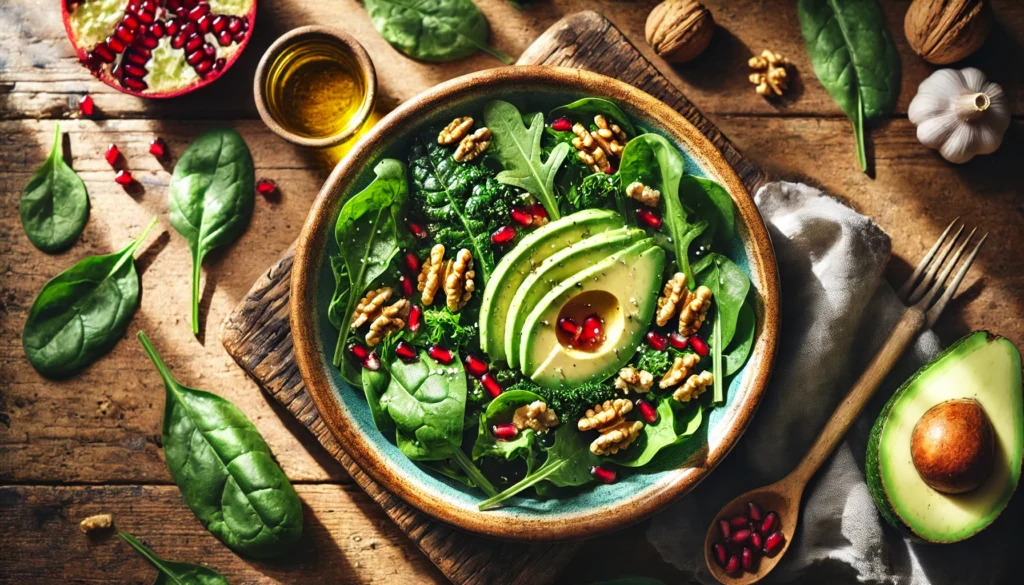Memory is a fascinating function of the human brain. It’s what allows us to recall past experiences, learn new skills, and plan for the future.
But have you ever wondered how your diet might influence your memory?
Research suggests that what we eat can have a significant impact on our cognitive function. Certain foods, in particular, are known to enhance memory and overall brain health.
In this comprehensive guide, we’ll delve into the science behind these brain-boosting foods. We’ll explore how they contribute to cognitive function and provide practical advice for incorporating them into your diet.
Whether you’re a health and wellness coach seeking reliable information for your clients, a science journalist translating complex data into engaging content, or a biohacker aiming to optimize mental performance, this guide is for you.
We’ll cover a wide range of topics, from the role of nutrition in cognitive function to the essential nutrients for memory enhancement. We’ll also provide a list of top brain-boosting foods and discuss how diet and lifestyle can contribute to optimal brain function.
Moreover, we’ll delve into the world of supplementation and how certain vitamins, minerals, and herbal supplements can support memory.
Finally, we’ll offer practical tips for incorporating memory-boosting foods into your diet, complete with recipes and meal ideas.
Our goal is to provide you with accurate, engaging, and practical advice based on the latest scientific research and trends.
So, are you ready to discover the top foods to enhance your memory?
Let’s dive in and start nourishing our brains.
You may also like: Breakthrough Medications Revolutionizing Memory Loss Treatment
Understanding Memory and Brain Health
Our brains are extraordinary organs, responsible for countless functions. Central to these is memory, a crucial element of cognitive processing. From short-term storage to intricate long-term recall, memory is foundational to how we learn and interact.
But how does the brain maintain such abilities? The answer lies partly in its complex chemistry. Neurotransmitters, neurons, and synapses work in harmony, transmitting information throughout the brain.
Memory formation involves multiple steps. Encoding, storage, and retrieval are key processes. They allow us to process, preserve, and access information.
While genes and environment play pivotal roles, diet is an often overlooked factor influencing brain health. Ensuring the brain receives vital nutrients can support these functions.
Foods rich in certain nutrients are known to enhance memory capabilities. These nutrients include omega-3 fatty acids, antioxidants, and essential vitamins and minerals. They support brain cell integrity, communication, and longevity.
Understanding which foods boost cognitive abilities can empower individuals. It can help maintain and improve memory performance throughout life.
Here are some key components to consider:
- Omega-3 fatty acids support neuron structure and function.
- Antioxidants protect brain cells from oxidative stress.
- B vitamins are crucial for neurotransmitter formation.
Each plays a unique role in enhancing memory and maintaining cognitive health. However, nutrition is only one piece of the brain health puzzle. Regular physical activity, adequate sleep, and stress management also significantly impact memory and cognition.
Finally, lifestyle choices often mirror each other. A healthy diet often accompanies other positive habits, creating a synergistic effect. This integrated approach is vital for optimal brain health.
The Role of Nutrition in Cognitive Function
Nutrition impacts every system in our body, including the brain. Our brains require a steady supply of nutrients to function optimally. Specific nutrients are fundamental to maintaining and enhancing brain function.
Omega-3 fatty acids, primarily found in fatty fish, play a crucial role in brain health. They support cell membrane fluidity and promote communication between brain cells. These fats are essential for neurotransmitter function, which is vital for memory retention and learning.
Antioxidants are another significant group. They help combat oxidative stress, reducing damage to brain cells. This damage is often linked with cognitive decline and memory loss as we age.
Vitamins, particularly B vitamins, are essential. They are involved in the synthesis of neurotransmitters, which are crucial for processing thoughts and information. Deficiencies can lead to cognitive impairments.
Minerals like magnesium and zinc also play roles in cognitive function. They aid in nerve transmission and synaptic plasticity, supporting learning and memory.
In essence, good nutrition provides the building blocks for healthy brain function. It’s not just about avoiding deficiencies but also optimizing intake for cognitive enhancement.
How Foods Impact Memory and Brain Performance
Foods have a profound impact on our cognitive performance. They supply the nutrients needed for brain health and help regulate mood and energy levels.
For instance, whole grains provide a steady release of glucose, the brain’s primary energy source. Regular energy supply is crucial for maintaining concentration and mental alertness throughout the day.
Fruits and vegetables offer more than just basic nutrition. Berries, rich in antioxidants, help mitigate oxidative stress that can impair memory. Leafy greens, packed with vitamins, support brain function and slow cognitive decline.
Protein-rich foods, such as eggs, provide amino acids important for neurotransmitter production. These chemical messengers play a role in mood regulation and memory retention.
Meanwhile, foods rich in healthy fats support brain cell structure and integrity. They provide the essential fatty acids necessary for maintaining fluid and flexible cell membranes.
Some foods also influence how we feel. Chocolate, containing flavonoids, improves blood flow to the brain and may enhance cognitive performance. It also stimulates endorphin release, improving mood.
When choosing foods, consider their nutrient density. Opting for nutrient-rich foods helps support both brain health and overall well-being. Balancing these food choices with other lifestyle factors can maximize cognitive function.
In conclusion, what we eat significantly impacts how well our brains perform. Choosing the right foods can enhance memory and protect brain health for years to come.

Essential Nutrients for Memory Enhancement
Memory is an intricate facet of brain function, and nutrition plays an indispensable role in its enhancement. Essential nutrients support memory by nourishing the brain and promoting healthy cognitive processes.
Primarily, these nutrients help maintain and strengthen neuronal connections. Neurons are the brain cells responsible for processing and transmitting information. Thus, optimal nutrition ensures these cells function effectively.
Dietary essentials include omega-3 fatty acids, antioxidants, vitamins, and minerals. Each contributes uniquely to cognitive health, impacting memory storage and recall. Let’s delve deeper into these vital nutrients.
Foods rich in omega-3 fatty acids, for example, are crucial for cognitive longevity. These healthy fats are significant for maintaining the integrity of brain cell membranes.
Antioxidants, on the other hand, guard against oxidative stress. Stress can damage cells, impairing memory and contributing to age-related decline.
We must also consider the role of various vitamins. B vitamins, in particular, facilitate numerous brain functions, including neurotransmitter synthesis.
Minerals such as magnesium and zinc also support brain health. They contribute to nerve function and the synthesis of essential neurotransmitters.
Incorporating these nutrients into a daily diet can greatly enhance brain function. A varied diet ensures you receive a wide spectrum of these essential compounds.
Omega-3 Fatty Acids and Brain Health
Omega-3 fatty acids are vital for maintaining brain health. Composed mainly of EPA and DHA, these fats play a crucial role in brain function. They’re most famously found in fatty fish like salmon and mackerel.
These fats are integral to cell membrane structure. They ensure that brain cells are flexible and efficient in transmitting signals. Such efficiency is key to learning and memory.
DHA is especially important for adult brain health. It’s abundant in the brain and contributes to neuronal communication. Higher levels of DHA are associated with better cognitive performance and reduced risk of cognitive decline.
Omega-3s are also known to combat inflammation. Inflammation can harm brain health over time, leading to memory impairment. Therefore, a regular intake of omega-3-rich foods supports both memory and overall brain function.
Antioxidants and Their Role in Memory
Antioxidants combat oxidative damage in the brain. Such damage can severely affect memory and cognitive abilities. Foods rich in antioxidants are therefore allies in maintaining brain health.
Berries are particularly high in antioxidants. Blueberries, strawberries, and raspberries are renowned for their powerful antioxidant properties. These antioxidants help protect the brain from harmful free radicals.
Free radicals are unstable molecules that can damage brain cells. Antioxidants neutralize these molecules, preventing cell damage. This protection helps maintain brain health and preserve memory function.
Some antioxidants, like flavonoids, improve neuronal communication. Better communication enhances memory processing and retrieval abilities. Incorporating antioxidant-rich foods into your diet can significantly boost memory.

B Vitamins and Cognitive Function
B vitamins are essential for a host of brain processes. They are involved in the synthesis of neurotransmitters, which are crucial for message transmission between neurons.
Vitamin B6, B12, and folic acid are especially noteworthy. They help regulate levels of homocysteine, an amino acid linked to cognitive decline.
Deficiencies in these vitamins can lead to cognitive impairments. For instance, a lack of Vitamin B12 might result in memory loss. Thus, it’s important to maintain adequate levels of these vitamins for cognitive health.
These vitamins are primarily found in meats, dairy, and leafy greens. Consistent intake supports better memory and mental clarity, reinforcing the need for these nutrients.
Minerals Essential for Brain Function
Minerals play crucial roles in maintaining brain health. Magnesium and zinc, in particular, are vital for optimal cognitive function.
Magnesium regulates neurotransmitter activity, ensuring smooth communication between neurons. It helps convert food into energy for brain functions.
Zinc, on the other hand, contributes to synaptic plasticity. This trait is essential for learning and memory enhancement.
Both minerals are found in a variety of foods. Whole grains, seeds, and nuts are excellent sources. Maintaining a balance of these minerals supports cognitive functions and memory.
Iron, though less discussed, is also critical. It aids in oxygen transport to the brain, which is essential for energy production and function.
Incorporating these essential minerals into a daily diet can bolster memory and cognitive health. Adequate mineral intake ensures the brain functions at its best.
Top Brain-Boosting Foods
Eating foods that enhance brain function is vital for memory and cognition. Certain foods are packed with nutrients specifically beneficial for the brain. Including these in your diet can significantly boost brain health. Here, we explore some top brain-boosting foods, explaining why they stand out for memory enhancement.
Fatty Fish: A Rich Source of Omega-3s
Fatty fish like salmon, sardines, and trout are excellent for brain health. These fish are abundant in omega-3 fatty acids. Omega-3s are essential for building brain cell membranes and promoting communication between brain cells.
Regular consumption of fatty fish is linked to a lower risk of cognitive decline. These fish also reduce inflammation, which can compromise brain health. Omega-3s also improve mood and enhance learning capabilities, making fatty fish an indispensable brain food.
Moreover, these fish can be prepared in numerous ways, adding diversity to your diet. Grilled, baked, or smoked, they’re both delicious and nutritious. Incorporating them into your weekly meals provides a steady supply of brain-enhancing nutrients.
Berries: Antioxidant Powerhouses
Berries such as blueberries, strawberries, and blackberries are rich in antioxidants. These fruits are packed with flavonoids, which help improve memory by enhancing cell signaling. Antioxidants combat oxidative stress, reducing inflammation and safeguarding brain health.
Research indicates that regular berry consumption can delay cognitive aging. They support neuronal communication and improve memory retention. Adding berries to your diet can therefore help maintain sharp memory and cognitive agility.
Berries are versatile and can be included in various meals. Whether added to oatmeal, smoothies, or salads, they bring both nutrition and flavor. Their antioxidant properties make them a colorful and vital component of a brain-healthy diet.

Nuts and Seeds: Nutrient-Dense Brain Boosters
Nuts and seeds are rich in nutrients essential for brain health. They contain healthy fats, antioxidants, and vitamins, which are key for cognitive function. Walnuts, in particular, are an excellent source of DHA, a type of omega-3 fatty acid beneficial for the brain.
Eating nuts and seeds regularly can enhance memory and cognitive abilities. They’re linked to improved cardiovascular health, which supports adequate blood flow to the brain. Improved blood flow ensures the brain receives essential nutrients and oxygen.
Seeds like flaxseeds and chia seeds provide brain-supporting nutrients, including magnesium and zinc. These help maintain neurotransmitter balance, facilitating efficient brain function. Including a handful of nuts and seeds in your daily diet can therefore boost memory.
Snacking on nuts or adding seeds to meals enhances both taste and nutrition. They fit easily into various dishes, making them a convenient way to consume brain-boosting nutrients.
Leafy Greens: Vitamins and Minerals Galore
Leafy greens such as spinach, kale, and collard greens are bountiful in brain-beneficial nutrients. These vegetables provide key vitamins like K, C, and several B vitamins that support brain health. They also contain antioxidants that help prevent cognitive decline.
Consuming leafy greens is linked with slower mental aging and enhanced memory. They help maintain cognitive processes and keep the brain functioning optimally. The nutrients in these greens are also vital for constructing neurotransmitters crucial for memory.
Besides, leafy greens are often rich in iron, which aids in oxygen transport to the brain. Including these vegetables in your diet ensures you get a wealth of vitamins and minerals supporting brain function.
Leafy greens can be easily incorporated into meals. Be it in salads, soups, or smoothies, they enhance both color and nutrient content. Regularly consuming these greens is an effective way to boost your brain health and memory.
Foods and Drinks That Support Memory Retention
Memory retention depends not just on solid food but also on what we drink. Hydration is crucial for optimal brain performance. Dehydration can impair short-term memory and attention. Including certain drinks in your routine can boost memory and cognitive function.
Some drinks are especially beneficial for memory improvement. They include herbal teas, coffees, and beverages high in antioxidants. The right selection of these drinks can complement a brain-boosting diet.
In addition, the combination of certain foods and drinks can have synergistic effects. They work together to enhance overall cognitive health. Here, we’ll examine how various drinks support memory retention.
Hydration and Memory: What to Drink
Water is essential for maintaining concentration and memory. Mild dehydration impairs focus and short-term recall. To support brain health, ensure adequate water intake throughout the day.
Beyond plain water, other drinks can help with hydration. Coconut water is a good option. It is rich in electrolytes that support nerve function.
Herbal teas, like chamomile or peppermint, also aid in hydration. They offer calming effects which can reduce stress. A calm, hydrated brain retains information more effectively.
Furthermore, be mindful of your body’s hydration needs during physical and mental tasks. Regularly sipping water or hydrating beverages ensures your brain functions at its best.
Herbal Teas and Coffees: Caffeine and Antioxidants
Herbal teas are caffeine-free alternatives packed with antioxidants. Antioxidants combat oxidative stress, protecting brain cells. Green tea, for instance, is rich in catechins that support brain function.
Coffees, known for their caffeine content, can also enhance alertness. Moderate caffeine intake boosts concentration and mood. It may even improve long-term memory retention.
Herbal teas such as ginkgo biloba or rosemary offer unique cognitive benefits. They are believed to enhance circulation and support memory. Including a variety of teas in your routine offers diverse brain benefits.
However, it’s crucial to consume caffeine mindfully. Excessive caffeine can lead to anxiety or sleep issues, negatively impacting memory.
Dark Chocolate and Flavonoids
Dark chocolate is a delightful treat that supports brain health. It’s rich in flavonoids, compounds known to enhance memory. Flavonoids improve blood flow to the brain, aiding cognitive processes.
Consuming moderate amounts of dark chocolate is linked to better problem-solving skills. It also enhances attention and overall cognitive performance. The experience of enjoying chocolate’s rich taste can also uplift mood, supporting mental clarity.
Dark chocolate contains caffeine, albeit in lesser amounts than coffee. This provides a gentle boost in focus without a significant stimulant effect. Its blend of antioxidants and mild caffeine is ideal for memory retention.
For optimal benefits, choose dark chocolate with at least 70% cocoa. This higher cocoa content ensures a richer concentration of beneficial compounds.
Diet and Lifestyle for Optimal Brain Function
Achieving optimal brain function requires more than just eating brain-boosting foods. A holistic approach incorporating diet, lifestyle, and exercise is vital. Each aspect significantly impacts cognition and memory.
The Mediterranean diet exemplifies a dietary pattern enhancing brain health. It emphasizes plant-based foods, healthy fats, and lean proteins. Regular consumption of such a diet aligns with reduced cognitive decline risks.
Lifestyle factors, like managing stress and getting quality sleep, are also crucial. Chronic stress can impair memory formation and retrieval. Conversely, restful sleep consolidates memories, making it easier to recall information.
Physical activity complements dietary habits. It boosts blood flow to the brain, encouraging the growth of new brain cells. Combined, these elements foster an environment conducive to cognitive enhancement.
The Mediterranean Diet and Brain Health
The Mediterranean diet is renowned for its numerous health benefits. It’s rich in fruits, vegetables, whole grains, and healthy fats. These foods support cognitive function and may lower dementia risks.
Olive oil, a diet staple, is high in monounsaturated fats and antioxidants. These components reduce inflammation and protect brain cells. The diet’s balance of omega-3 and omega-6 fatty acids is also advantageous.
Adopting this diet also emphasizes social meals and mindful eating. These practices promote stress reduction and mental well-being. Such a diet provides a comprehensive approach to nurturing brain health.
Furthermore, research links the Mediterranean diet to slower cognitive decline. Individuals adhering to this diet tend to maintain better memory function. Thus, incorporating its principles can lead to long-lasting brain benefits.
The Impact of Sugar and Processed Foods on Memory
Excess sugar and processed foods can impair memory and cognition. High sugar intake leads to inflammation and oxidative stress. These factors damage brain cells, affecting memory and learning.
Processed foods often lack essential nutrients needed for brain health. They are high in unhealthy fats and additives. Consumption of these foods is linked to poorer cognitive outcomes.
Refined sugars in particular disrupt the balance of neurochemicals. They can cause short-term memory lapses and mood swings. Over time, a diet high in sugar and processed foods may contribute to cognitive decline.
Choosing whole, unprocessed foods supports better brain function. It provides the necessary nutrients and sustains energy levels. Hence, cutting down on refined sugars and processed foods is vital for memory enhancement.
Exercise and Brain Health: A Synergistic Relationship
Exercise and brain health share a synergistic relationship. Physical activity stimulates brain cell growth and connectivity. It enhances neuroplasticity, the brain’s ability to adapt and grow.
Moderate exercise improves blood circulation, delivering oxygen and nutrients. This increase in blood flow supports memory and problem-solving skills. Regular physical activity is associated with better memory retention.
Exercise also reduces stress and improves sleep quality. Both are critical factors in cognitive function and memory. Reduced stress levels improve focus and information retention capabilities.
Incorporating exercise into daily routines amplifies the benefits of a brain-healthy diet. Activities like walking, cycling, or yoga can be especially effective. Together, exercise and a balanced diet significantly bolster cognitive performance.

Enhancing Memory Through Supplementation
Supplementation offers additional avenues to support memory enhancement. Vitamins, minerals, and herbal supplements can fill dietary gaps. They can promote cognitive health alongside a balanced diet.
Vitamins like B6, B12, and folic acid are vital for brain function. These nutrients play a role in neurotransmitter production. They also help maintain healthy nerve cells and cognitive processes.
Minerals like magnesium and zinc support brain performance. Magnesium contributes to memory and learning functions. Zinc is crucial for neurological function and memory preservation.
Herbal supplements have gained popularity for their cognitive benefits. Nootropics, or “smart drugs,” are designed to enhance memory. These supplements can improve focus, motivation, and overall mental clarity.
When considering supplementation, individual needs and lifestyle factors are key. It’s essential to consult healthcare professionals for personalized advice. Their guidance ensures safe and effective supplement use.
A combination of supplements can be more effective than a single one. Here are some common memory-supporting supplements:
- Ginkgo Biloba: Enhances blood flow to the brain.
- Fish Oil: Rich in omega-3 fatty acids for brain health.
- Curcumin: An anti-inflammatory compound found in turmeric.
- Bacopa Monnieri: A traditional herb for cognitive enhancement.
- Rhodiola Rosea: Helps reduce fatigue and boosts concentration.
Vitamins and Minerals for Memory Support
Vitamins and minerals are integral to memory and cognition. B vitamins, particularly B6, B12, and folic acid, are paramount. They facilitate neurotransmitter synthesis, supporting brain function.
Vitamin D also plays a role in cognitive health. It supports nerve cell growth and reduces inflammation. Deficiency in vitamin D has been linked to cognitive decline.
Minerals such as magnesium and zinc aid in memory retention. Magnesium boosts synaptic plasticity, crucial for learning. Zinc supports optimal brain signaling and neuroprotective effects.
Herbal Supplements and Nootropics
Herbal supplements offer natural memory enhancement options. Ginkgo biloba is often used to improve blood circulation in the brain. It’s believed to enhance memory and cognitive speed.
Nootropics are popular for boosting mental performance. These include ingredients like piracetam and L-theanine. They may enhance creativity, motivation, and mental acuity.
Adaptogens like ashwagandha and rhodiola are also beneficial. These herbs help manage stress, indirectly supporting memory. By reducing stress, they improve overall mental function and resilience.
Practical Tips for Incorporating Memory-Boosting Foods into Your Diet
Incorporating memory-enhancing foods into your diet doesn’t have to be challenging. With small, mindful changes, you can enjoy health benefits. Begin by identifying nutrient-rich foods that support cognitive function.
Start with a focus on variety and color. Eating a range of colorful fruits and vegetables ensures diverse nutrients. Each color represents different vitamins, minerals, and antioxidants crucial for brain health.
Plan your meals around whole foods. Choose fresh ingredients over processed products. Whole foods provide more nutrients and are better for overall health.
Maintaining a balanced diet is key. Aim for a mix of protein, healthy fats, and carbohydrates in each meal. This balance sustains energy levels and supports cognitive processes.
Take gradual steps when making dietary changes. Introduce new foods slowly. This allows your palate and body time to adjust.
Mindful eating can enhance the enjoyment of food. Pay attention to taste, texture, and aroma. This practice can improve digestion and nutrient absorption.
Consulting a nutritionist or dietitian can provide personalized guidance. They can help tailor diet plans to meet individual health and memory goals.
Simple Dietary Changes for Better Memory
Incorporating brain-healthy foods is simpler than it seems. Start by adding one or two memory-boosting foods to your daily meals. For example, incorporate a handful of walnuts or flaxseeds as snacks.
Another easy change is to integrate leafy greens into your diet. Swap iceberg lettuce for spinach or kale in salads. Leafy greens provide rich sources of vitamins and minerals that support cognitive function.
Enhancing your breakfast with whole grains is beneficial. Choose oats or whole-grain cereals instead of refined options. Whole grains release energy gradually, aiding memory retention and focus.
Consider replacing high-sugar snacks with fruits. Berries, especially, are excellent choices due to their antioxidant properties. They aid in reducing oxidative stress and inflammation in the brain.
Recipes and Meal Ideas
Here are some meal ideas to inspire your memory-boosting journey:
Breakfast
- Berry Smoothie Bowl: Blend mixed berries, yogurt, and a teaspoon of flaxseed for breakfast.
- Oatmeal with Nuts: Cook oats with almond milk, topped with walnuts, and a sprinkle of cinnamon.
Lunch
- Leafy Green Wrap: Use large lettuce leaves filled with avocado, turkey, and a sprinkle of pumpkin seeds.
- Whole Grain Salad: Mix quinoa with spinach, cherry tomatoes, and a drizzle of olive oil.
Snack
- Trail Mix: Combine almonds, dried blueberries, and dark chocolate chunks.
- Carrot Sticks: Dip in hummus made with olive oil and garlic.
Dinner
- Salmon Fillet: Bake with lemon and herbs, served with steamed broccoli.
- Vegetable Stir-Fry: Use sesame oil, ginger, mixed vegetables, and tofu.
Integrating these foods can be both nutritious and delicious. Exploring new recipes adds excitement and variety to your diet. These simple changes can significantly enhance your memory and brain health over time.

Conclusion and Key Takeaways
Incorporating memory-enhancing foods into your diet is a powerful way to support brain health. By focusing on nutrient-rich choices like leafy greens, fatty fish, nuts, and berries, you can boost cognitive function significantly. These foods not only contribute essential nutrients but also help combat oxidative stress and inflammation, which are critical for maintaining a healthy brain.
Consistency in consuming these foods is vital for observing long-term benefits. Regularly including a variety of brain-boosting foods ensures a steady supply of nutrients necessary for optimal mental performance. Small, sustainable changes in your dietary habits can lead to noticeable improvements in memory and cognitive abilities.
Moreover, the journey of enhancing brain function is holistic. It intertwines with lifestyle factors such as exercise, hydration, and mindfulness. Combining a nutritious diet with physical activity and stress management amplifies the positive effects on memory and overall well-being.
Ultimately, the path to better memory is about balance and variety. Enjoying a colorful, diverse diet creates a foundation for lifelong brain health. As you embrace these nutritional strategies, you’re not only fostering better memory but also enhancing your quality of life.
Further Reading:
15 “Brain Foods” That May Help Preserve Your Memory
Foods linked to better brainpower
Cognitive Health: Top 11 Brain Foods for Seniors
Important Note: The information contained in this article is for general informational purposes only, and should not be construed as health or medical advice, nor is it intended to diagnose, prevent, treat, or cure any disease or health condition. Before embarking on any diet, fitness regimen, or program of nutritional supplementation, it is advisable to consult your healthcare professional in order to determine its safety and probable efficacy in terms of your individual state of health.
Regarding Nutritional Supplements Or Other Non-Prescription Health Products: If any nutritional supplements or other non-prescription health products are mentioned in the foregoing article, any claims or statements made about them have not been evaluated by the U.S. Food and Drug Administration, and such nutritional supplements or other health products are not intended to diagnose, treat, cure, or prevent any disease.


